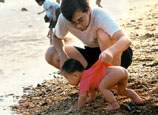
A 30-time visitor to China, I remain a perpetual outsider despite being an honorary citizen of Chengdu and lover of the country.
We have just come through another gaokao (national college entrance examination) season, a fitting time to reflect on how we develop human potential in China, and how well the US and Europe do it.
Many of the reflections are not comfortable, however.
The narrow scope of the gaokao keeps high school graduates away from acquiring skills in leadership, problem solving, innovation and other areas of talent demanded by multinational corporations.
It also leaves them unprepared for mate selection, perhaps the single most important life decision, which in turn drives up divorce rates and the destructive effects of single parenting.
Recent research confirms that the prevalent Chinese parenting style, characterized by placing high pressure on children, is psychologically damaging, and also fosters apathy, depression and anxiety.
Some parents pander to their overweight sons, who are overlooked by multinationals in favor of young women less self-centered and harder working.
Another serious problem is that the subject of ethics seems generally unknown in schools.
Chinese parents are by and large uncomfortable with this situation.
Many of them are willing to spend massive amounts of money to avoid it by sending their children to study overseas.
Children develop at different paces and in different ways. Far too many Chinese students are force-fed facts; they cannot be curious and experiment.
Innovators of the ilk of Bill Gates or Steve Jobs cannot emerge from China's education system in its current form.
So, what is the solution? Pursuing the all-round development of young people that encourages independence, productivity and no fear of failure would be a good start.
Such qualities provide parents and schools at all levels guidelines for shaping future curriculums.
These are all virtues that need to be encouraged during schooling to put students in good personal and professional stead. China needs these qualities among its people for healthy families and productive individuals.
It isn't all doom and gloom in China, however.
In 2010, Shanghai students topped the Program for International Student Assessment, an international test of practical knowledge in reading, mathematics and science.
We can learn from Shanghai, as well as from international research.
















 The Bund turns into beach as the temperature reaches high
The Bund turns into beach as the temperature reaches high


![]()
